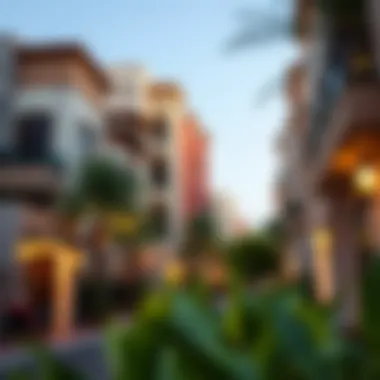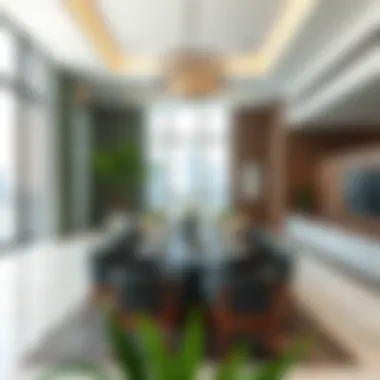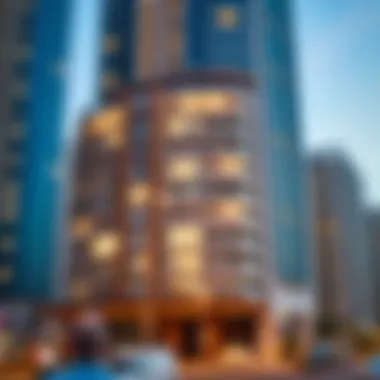Guide to Monthly Rent Flats in Dubai


Market Trends
Current Real Estate Landscape
Renting a flat in Dubai isn't like deciding to pick a flat from a mall; it's an experience entwined with the vibrant pulse of the city’s dynamic real estate market. As of now, the Dubai rental market is seeing a complex weave of demand and supply. The influence of global economic conditions and local regulations can shape rental prices in unexpected ways.
Recent reports suggest that rents have somewhat stabilized in various neighborhoods compared to the peaks of previous years. Areas such as Dubai Marina and Downtown Dubai still hold a firm grip on high rental prices, but we can see shifts in preference as families and individuals look for more affordable options in places like Dubai Silicon Oasis and Jumeirah Village Circle. Despite the continuous influx of expatriates seeking accommodation, potential tenants are becoming savvy, researching extensively and comparing properties, which exerts pressure on landlords to be competitive.
Future Predictions and Insights
Looking ahead, several factors will likely influence rental trends in Dubai. For starters, the upcoming World Expo 2020 (now pushed to 2021 due to global events) is expected to attract more people, ramping up demand in the rental market. However, with new developments being rolled out in various areas, it might balance the scales.
Analysts are predicting that the rental prices will see a gradual increase, but speculating a great paralleled rise could be too optimistic. For prospective tenants, understanding these trends can be key in negotiating leases or finding the right time to make a move.
"Knowledge of the market trends can be as essential as the apartment size itself."
Investment Strategies
Smart Property Investments
For those poised to dip their toes into the rental market as investors rather than tenants, it’s imperative to grasp the nuances involved in property investment in Dubai. Selecting a property with good returns requires more than just eyeing the fancy jacuzzi or that sleek kitchen. It’s about understanding the local demographic and anticipating what type of properties will benefit from upcoming development plans.
Horizontal expansions in the city, like new transport links, can massively uplift the desirability of a neighborhood. Savvy investors look for areas such as Mirdif, where new schools and shopping complexes are joining the scene, increasing their appeal.
Financing Options for Investors
For prospective investors, investigating the available financing options is crucial. There are several pathways to acquire a flat, ranging from traditional bank loans to specialized real estate investment funds. Occasionally, developers also may have unique financing programs that allow for more flexible terms.
It’s wise to thoroughly assess the requirements, interest rates, and the implications of each option. Whether you're a seasoned investor or just starting, sound financial planning entwined with market insight can set the stage for favorable investments in Dubai’s rent flats.
Understanding the Dubai Rental Market
Navigating the rental market in Dubai can be a task that feels as daunting as finding a needle in a haystack. The emirate’s real estate landscape is forever evolving, driven by a multitude of factors that influence the market. When considering a monthly rental flat, grasping the dynamics of this market is key for making informed decisions.
One cannot overlook the variety of influences at play; from economic shifts to cultural trends, each piece weaves into the larger tapestry of renting in this vibrant city. Understanding these elements allows potential tenants to plan their moves wisely, ensuring that they find the right fit for their lifestyles and budgets.
Current Trends in the Rental Market
The rental market in Dubai is not just a straightforward affair; it ebbs and flows with trends that can reveal much about where the market may be headed. Currently, there’s a marked shift towards flexible living conditions, particularly due to the increased prevalence of remote work. This has driven many to seek out short-term leases, with landlords adapting to these demands by offering more month-to-month options.
Additionally, luxury rental properties are seeing a rise in interest as individuals and families seek an upgraded living experience, often prioritizing amenities and location over sheer size. Thus, the phrase “more bang for your buck” has never been more relevant in a market where the right flat in the right location can mean a world of difference.
Factors Influencing Rental Prices
In any rental landscape, a plethora of factors plays a significant role in dictating prices. Here, we break down a few key areas to consider:
Supply and Demand Dynamics
Supply and demand are the heartbeat of the rental market. When the market is flush with options—say, after a new complex pops up—prices can dip as landlords vie for tenants. Conversely, in areas where housing options are few and far between, prices can surge.
The incentive for landlords is clear: to maintain competitiveness, they need to be mindful of current demand. This creates a scenario where both sides—tenant and landlord—must stay attuned to market status. For those hunting for deals, understanding this dynamic can unlock doors to suitable accommodation without breaking the bank.
Geographical Location
In Dubai, the location of a property can be its own selling point. From swanky waterfront views in Dubai Marina to the bustling energy of Downtown, each neighborhood offers a different vibe that appeals to varying lifestyles. Generally speaking, areas closer to business hubs or cultural landmarks command higher rents.
However, one must balance location against personal needs. A flat located a bit further out may offer more space or amenities, making it a worthwhile compromise. The saying “location, location, location” holds a weighty truth in the Dubai rental market.
Property Type and Features
The type of property and its features can significantly change rental prices. For instance, a studio apartment generally affords a lower rental price compared to a three-bedroom unit. Oversized balconies, swimming pools, or state-of-the-art gyms can add premium costs but might justify the investment for those who prioritize comfort.
When navigating these considerations, one must ask: what features truly enhance living quality? Too often, tenants find themselves in a bidding war for luxury they don't need, potentially overlooking more practical options.
Impact of Seasonal Changes
Seasonal fluctuations in Dubai can mirror those of other metropolitan areas but often come with their distinct characteristics. Holidays, school breaks, and even the climate can drive shifts in rental activity. For instance, January usually brings a rush of newcomers, pushing demand in the early months of the year.
Recognizing these patterns allows renters to either leverage them for a better deal or time their searches strategically, maximizing their chances of winding up in the right place at the right price.
"Understanding the nuances of the rental market isn’t just about finding a flat; it’s about securing a place that fits your life, your needs, and your budget."
Navigating the Dubai rental market with an astute sense of awareness not only arms you with knowledge but also places you in the driver’s seat, enabling you to make informed, confident choices.
Popular Neighborhoods for Monthly Rentals
Understanding the neighborhoods of Dubai is crucial for anyone looking to rent a flat. Each area has its unique vibe, amenities, and price range, impacting one’s overall living experience. The right neighborhood can offer convenience, lifestyle options, and a sense of community, making it essential to consider factors such as proximity to work, schools, and entertainment options. Here, we’ll delve into several prominent neighborhoods, each offering distinct benefits to potential renters.
Dubai Marina: A Coastal Haven


Dubai Marina stands tall among the city’s most sought-after neighborhoods for monthly rentals. Its stunning waterfront views and vibrant atmosphere create an idyllic living space for many expatriates and locals alike. The area boasts a plethora of dining options, ranging from casual eateries to high-end restaurants overlooking the Marina. Additionally, the Marina Walk, a picturesque promenade, draws joggers, cyclists, and those simply enjoying the view.
Rental prices here can be on the higher side, reflective of the luxurious lifestyle and convenience that this coastal haven offers. Residents benefit from access to beaches, shopping centers, and vibrant night life, making it a favorite for young professionals and families wanting a taste of the city's fast pace.
Downtown Dubai: The Urban Pulse
Downtown Dubai is the beating heart of the emirate, packed with a blend of modern living and cultural vibrancy. Home to the iconic Burj Khalifa and Dubai Mall, the area attracts those who seek city life at its best. Renting a flat in this bustling urban hub provides unparalleled access to world-class dining, shopping, and entertainment. However, one must keep in mind that the rental costs here can be significantly higher due to its prime location.
With well-planned infrastructure and an array of community amenities, Downtown Dubai promises a lifestyle filled with convenience and excitement. Whether it’s late-night shopping or attending a concert in the area, twilight life here pulsates with energy, attracting both young professionals and families.
Jumeirah: A Luxurious Escape
Jumeirah presents a more laid-back yet sophisticated lifestyle. Known for its serene beaches and sprawling villas, this neighborhood attracts affluent renters looking for luxury and tranquility. Newly developed properties often offer high-end finishes and a close-knit community feel. Jumeirah is also revered for its proximity to international schools, making it a desirable choice for families.
The charm of this neighborhood lies in its blend of traditional and modern architecture. Residents can enjoy the local cafés and boutiques, giving it a unique cultural flavor. However, affordability is a crucial aspect to consider, as rental prices can easily climb due to the prestige associated with living in this desirable enclave.
Al Barsha: A Family-Friendly Community
Al Barsha stands out for its reputation as a family-oriented neighborhood. It offers a balance of affordability and quality living, with various schools, parks, and shopping centers in close proximity. Families can find spacious flats that cater to their needs while still being well connected to the rest of the city. The area’s community spirit shines through in its parks and recreational areas, giving children and adults opportunities for leisure activities.
Moreover, thanks to its strategic location near the Mall of the Emirates, residents have access to numerous entertainment options. This neighborhood is truly a hidden gem for those looking for value without compromising on lifestyle.
Business Bay: The New Financial District
Business Bay is rapidly becoming the go-to hub for young professionals and entrepreneurs. Its proximity to Dubai’s central business district makes it an ideal choice for those who want short commutes. The area features a mix of modern high-rise apartments and commercial spaces, making it a dynamic place to live and work.
Renting in Business Bay provides easy access to public transport, which is a considerable advantage for daily commuters. The bustling atmosphere, coupled with a variety of dining and entertainment options, creates a lively environment that is hard to resist. Although rental prices lean towards the higher side, many find the benefits overwhelmingly justifiable.
“When choosing a neighborhood, keep in mind not only the rental costs but also the lifestyle and amenities available in the area. It’s about finding the right fit for your needs.”
Budgeting for Monthly Rent in Dubai
Budgeting is more than just a financial exercise; it’s the foundation upon which your living experience in Dubai can rest. With the rental market ever-changing and demand fluctuating, the ability to set a well-thought-out budget is crucial. Without this groundwork, potential renters might find themselves in financial hot water or locked into agreements that don't align with their financial goals. Proper budgeting enables you to evaluate options pragmatically and ensures that you don’t just pick a flat because it looks good.
Determining Your Budget
Income vs. Expenses
When considering how much you should spend on rent, the relationship between income and expenses is a pivotal factor. Seeing is believing, and breaking down your monthly income against regular expenses—like food, transportation, and other discretionary spending—provides a clear picture. Ideally, many experts recommend keeping your rent to around 30% of your total income. This 60/40 rule serves as a guideline to understand what you can afford without breaking the bank.
Furthermore, by analyzing your income against your potential expenses, you create a financial cushion. You prevent pitfalls that might send you spiraling into debt. One unique trait of this approach is its adaptability; as circumstances shift, you can redo this calculation.
However, overlooking expenses that might fluctuate, like utility bills or maintenance costs, could pose risks. This method’s hallmark is its straightforwardness, making it a reliable strategy for anyone exploring the rental landscape in Dubai.
Savings for Deposit
While budgeting for monthly rent, one must not ignore the significance of having savings designated for a security deposit. In Dubai, it’s common to see deposits amounting to one month’s rent—sometimes even more depending on the property, so having funds set aside can be a game-changer. By prioritizing savings for deposits, you place yourself in a position of strength when looking for rental agreements.
Moreover, setting aside a deposit offers protection against unexpected financial strains. The unique aspect here lies in its dual purpose: it not only smoothens the rental process but also builds a financial habit that can extend to future planning. However, if you assign too much of your savings to your deposit without a buffer for living expenses, it could backfire, putting you right up a creek without a paddle. The key is to strike a balance—saving for a deposit while ensuring you have funds available for daily living.
Understanding Additional Costs
While rent is the most visible expense, understanding the additional costs tied to monthly rentals in Dubai is equally important. Many renters often overlook these supplementary fees, which may eat into their monthly budget.
Utilities and Maintenance Fees
Utilities and maintenance fees should top the list of additional costs evaluated. In Dubai, these fees are sometimes included in the rent, but they can also be billed separately. Expect to pay for electricity, water, and water sewage. Renters should clarify with landlords whether these costs are additional so that budgeting can be more accurate.
On a tight budget, overlooking these inevitable expenses could lead to unwelcome surprises at the end of the month. The simplicity of tracking these recurring charges can be a unique factor—if you understand what to anticipate, managing the total expenses becomes more straightforward, thus supporting a more stable financial outlook.
Community Service Charges
Similarly, community service charges can be an overlooked but essential aspect. These fees often cover the maintenance of communal areas, landscaping, and security services in neighborhoods. By knowing the average charges in various areas beforehand, you can tailor your search to neighborhoods that align with your overall budget. Not every building or community imposes the same charges, and many people find that some properties feel like a steal, yet are loaded with service fees that can add up.
Not knowing about these charges might lead renters into tempting properties that, in reality, exceed their budget. Therefore, familiarizing yourself with local neighborhoods and how they operate can ultimately save a financial headache later on.
In summary, budgeting for monthly rent in Dubai is intricately tied to understanding both income and expenses, as well as additional costs like utility and community service charges. The goal isn't just to stick to a number; it's about ensuring financial security while also enjoying life in an exciting city like Dubai.
Identifying Must-Have Amenities
When searching for monthly rentals in Dubai, it’s crucial to consider the amenities that can enhance your living experience. The right features can transform a basic flat into a home that meets your lifestyle needs. You may find that some amenities contribute significantly to your day-to-day life, while others may not hold as much value for you. An understanding of what’s available and what’s essential can greatly assist you in making this important decision.
Essential Features to Look For
Security and Safety Measures
Security is a top priority for renters, especially in a bustling city like Dubai. Having adequate security measures in place can grant peace of mind, allowing you to feel at home right away. Depending on where you rent, security features may include:
- CCTV Cameras: Continuous monitoring can reduce risks and deter potential unpleasant situations.
- 24/7 Security Personnel: Having trained staff on guard provides an extra layer of safety.
- Smart Locks: Convenient, secure access systems can ease worries about traditional keys being lost.
These features aren’t just popular; they’re almost expected in urban living these days. Think about it – when you come home late at night, knowing there’s a professional keeping watch can make all the difference in feeling secure. On the downside, some buildings with extensive security features might charge higher rent or additional fees. But for many, the benefits of peace of mind outweigh the costs.
Parking Facilities


For those with vehicles, parking facilities are a must-have. In Dubai, where the number of cars seems to be ever-increasing, secure and convenient parking can greatly affect your rental choice. The key characteristics that make parking essential include:
- Designated Parking Spaces: Having a reserved spot can alleviate the stress of finding parking on busy days.
- Covered Parking: This protects your vehicle from the scorching sun and abrupt weather changes in Dubai.
- Accessibility: Easy access to the parking lot from your unit is a practical consideration.
The challenge here might be finding a flat with ample and affordable parking. Some neighborhoods might not even have proper parking arrangements, while others charge extra for security features. It’s beneficial to weigh your options based on your driving habits and lifestyle needs, ensuring you’re aware of the possible costs and constraints.
Desirable Community Amenities
Swimming Pools and Gyms
While living in Dubai, a swimming pool or gym can elevate your living standards significantly. Many residences come with these features for a good reason:
- Health and Fitness: Having a gym nearby saves time and encourages you to maintain your fitness regimen.
- Social Opportunities: A pool area can be a hub for relaxation and community interactions.
- Cooling Off: With Dubai’s heat, a pool is not just a luxury; it becomes a necessity during summer.
However, the drawback can often lie in the maintenance fees attached to these amenities. Sometimes, the costs can add a hefty amount to your monthly expenses, which new renters might not always budget for. Carefully assess how much you value fitness and leisure when choosing a rental with these offerings.
Parks and Recreational Areas
Having parks and recreational spaces nearby can significantly enhance your living experience. These areas are not just good for physical activities; they also promote community gatherings and relaxation. Key considerations include:
- Accessibility: Proximity to parks can make outdoor weekends a breeze.
- Family Friendly: Playing areas for children or open spaces for family picnics foster a sense of community.
- Green Spaces: Nature around your apartment can improve air quality and mental well-being.
The downside, however, is that not all neighborhoods in Dubai are designed with ample green spaces. Some may be far from parks, making it essential to check the location related to parks and recreational facilities before committing to a lease. This might make a world of difference, particularly for families seeking a healthy lifestyle.
Overall, identifying must-have amenities is an essential step for potential renters who wish to navigate the Dubai rental market successfully. Prioritize what features matter most to you, as this can lead to a far more satisfying living experience in the long run.
Navigating Lease Agreements
Navigating lease agreements in Dubai is a crucial aspect of finding a suitable flat for rent. Lease agreements dictate the terms of your relationship with the landlord, ensuring that both parties have clear expectations. Understanding the fine print can save you significant headaches later on. Knowledge of key elements like lease duration and termination clauses becomes indispensable for renters wanting to secure their housing smoothly and without unnecessary complications.
Key Terms to Understand
Lease Duration
Understanding the lease duration is paramount in any rental agreement. In Dubai, leases can vary significantly, ranging from short-term agreements of six months to longer engagements of two years or more. One key characteristic of lease duration is its flexibility. Shorter leases may appeal more to expatriates or those in transition, allowing them to reassess living situations more frequently.
The advantage of a longer lease is stability. Landlords may offer a lower monthly rate for tenants willing to commit for the longer haul. However, it also comes with a unique feature: less flexibility. If personal situations change, being locked into a lengthy lease can lead to financial strain and hassles like finding someone else to take over the lease. Thus, choosing the right lease length serves as a linchpin in the renting process.
Termination Clauses
Next comes the termination clauses, an area that deserves careful examination. These clauses spell out the conditions under which either party can exit the lease. A rental agreement without clear termination terms can become a double-edged sword. On one hand, strict clauses favor landlords, ensuring they aren’t left midair when a tenant suddenly vacates. On the other hand, they can trap tenants in unwanted situations.
Typically, a well-defined termination clause allows renters to exit with proper notice, usually around 30 to 90 days, without financial repercussions. It’s important to negotiate favorable terms that fit your long-term plans. You might find a unique feature in these terms where mutual agreement can facilitate a smoother exit for both parties. Such arrangements can serve as a safety net, providing reassurance when life’s uncertainties come knocking.
Negotiating Lease Terms
Negotiating lease terms can often feel like walking on thin ice, especially for first-time renters in a bustling city like Dubai. Having a solid understanding of lease details puts you in a much stronger position to advocate for your needs. Often, due diligence in negotiating might uncover areas that could lead to cost savings or more favorable living conditions. Whether it’s earning a decreased rent by agreeing to a longer duration or discussing repair responsibilities, each point provides an opportunity to make your rental experience more fulfilling.
Being prepared with market data and understanding local norms will empower you during negotiations. Remember, a good lease agreement is one that benefits both parties. Seek balance, and you might just walk away feeling like you struck gold.
Utilities and Services in Dubai Rentals
Understanding utilities and services in Dubai rentals is essential for anyone considering living in this vibrant city. The functioning of these services underpins daily life, influencing comfort, convenience, and even budgetary constraints. From basic utilities like electricity and water to internet and TV services, every detail plays a significant role, providing both functionality and comfort to residents. By equipping yourself with the right knowledge about these utilities, you can avoid surprises that might otherwise disrupt your settling-in process.
Setting Up Utilities
Electricity and Water
When it comes to renting in Dubai, setting up electricity and water is a non-negotiable first step. These two are the lifelines of your home. In Dubai, the primary provider for electricity is Dubai Electricity and Water Authority (DEWA), which operates effortlessly to ensure a steady supply to its customers.
One of the key characteristics of DEWA is its commitment to sustainability. They have been proactive in incorporating renewable energy sources, aiming to hit ambitious targets for solar energy. This commitment means that you’re not just getting power; you’re tapping into a system increasingly focused on environmental well-being. Setting up an account is relatively straightforward, usually requiring some documentation such as your Emirates ID and tenancy contract.
However, consider the cost implications as well. While the supply is reliable, monthly bills can vary depending on usage, especially in the scorching summer months when the air conditioning units work overtime. For a smoothly running household, being aware of seasonal consumption rates and budgeting accordingly is wise.
"The first step to a comfortable Dubai lifestyle is having your utilities in place. You handle that right, and the rest flows easier."
Internet and TV Services
In the age of digital connectivity, choosing the right internet and TV services cannot be overlooked. One of the most popular providers for these services in Dubai is Du, known for its competitive pricing and bundled deals. Another major contender is Etisalat, which boasts impressive coverage and reliability.
The key feature that sets these services apart is speed and accessibility. High-speed internet is essential in today's world, whether it’s for working remotely or streaming your favorite shows. Both service providers offer various packages catering to different needs, from basic browsing to high-definition streaming.
Disadvantages can creep in, though. Sometimes installation might take longer than expected, especially if the building has outdated infrastructure. Plus, the varying quality of customer service can lead to frustration. It’s always advisable to read up on user reviews before locking into a long-term contract.
Maintenance Responsibilities
Maintenance in a rental property often falls under a gray area, so it’s crucial to clarify responsibilities upfront to avoid conflicts later. Most landlords in Dubai are responsible for major maintenance issues, such as structural repairs, while tenants generally handle day-to-day upkeep.
Paying attention to details outlined in the lease is vital. Common responsibilities that renters typically bear include:
- Routine cleaning and maintenance of appliances
- Reporting any issues promptly to the landlord for action
- Maintaining garden and outdoor spaces (if applicable)


However, responsibilities can vary, and being proactive in discussions with your landlord can pave the way for a smoother living experience. Make sure everything is stated in the lease agreement to prevent any misunderstandings later.
Legal Considerations for Renters
Understanding the legal landscape surrounding renting in Dubai is crucial for anyone considering a monthly lease in the city. Knowledge of legal rights and obligations not only protects tenants but also fosters a smoother renting experience. By being informed, renters can avoid potential pitfalls, disputes, and unexpected costs that may emerge throughout their tenancy.
A critical aspect of the Dubai rental market is its distinct legal framework. Different from many Western countries, Dubai has its own set of regulations aimed at governing rentals and protecting the rights of both landlords and tenants. Familiarity with these legal parameters can prevent misunderstandings and help renters make informed decisions, especially for expatriates who may not be well-versed in local laws.
Tenant Rights in Dubai
Renters in Dubai enjoy a variety of rights that are designed to ensure fair treatment. This includes the right to live in a safe and habitable environment. If issues arise, like a lack of water or persistent building maintenance problems, tenants have the right to request that the landlord fix these issues in a timely manner. Additionally, tenants are protected from unjust eviction, provided they adhere to the terms of their lease agreement.
Important tenant rights in Dubai include:
- Fair Treatment: Landlords cannot arbitrarily increase the rent or terminate the lease without following proper procedures.
- Privacy Rights: Tenants have the right to their privacy, meaning landlords should provide notice before entering rented premises unless in emergencies.
- Deposit Return: Upon lease termination, tenants have the right to receive their security deposit back, subject to any legitimate deductions for damages.
Regulatory Bodies and Resources
The Real Estate Regulatory Agency, commonly known as RERA, plays a vital role in managing and overseeing the rental market in Dubai. This government body not only creates regulations but also provides resources for renters to understand their rights and responsibilities better. RERA's framework ensures that tenants and landlords adhere to fair practices.
RERA Guidelines
RERA guidelines form an essential part of the legal framework in Dubai's rental market. These guidelines encompass various regulations related to lease agreements, rental pricing, and tenant (and landlord) rights and responsibilities. A key characteristic of RERA is its aim to promote transparency and fairness in property transactions. This is particularly beneficial as it underlines the importance of written agreements and standardized practices.
A unique feature of RERA's guidelines is its emphasis on registration of leases. This process provides legal backing to rental agreements and aids in dispute resolution, ensuring that both parties adhere to the stipulated terms. Furthermore, RERA actively monitors rental prices, providing a rental index that helps tenants gauge what would be fair and standard in the market.
Advantages of RERA include:
- Protection for Tenants: Minimizes the risk of unfair rental hikes or unjust evictions.
- Standardized Processes: Streamlines lease agreements ensuring clarity for both parties.
Dispute Resolution Channels
The channels for dispute resolution provided by RERA are invaluable for any renter facing challenges or disputes with landlords. Mediation services and specialized committees are available to address complaints, making it easier for tenants to seek resolutions without resorting to lengthy legal battles.
A notable characteristic of these dispute resolution channels is their accessibility. Renters can submit their complaints online or in person, and they typically receive a prompt acknowledgment of their issues. This efficiency helps in reaching amicable agreements quickly.
Unique features of these channels include:
- Cost-Effective Solutions: Tenants can often resolve disputes without incurring high legal fees.
- Timely Resolutions: The process is structured to be quicker than traditional court procedures.
Tips for International Renters
Renting a flat in Dubai can be both an exciting and daunting task for international renters. Familiarizing oneself with local practices, norms, and potential hurdles is key to making the process smooth. The significance of understanding these elements cannot be overstated. Knowing what to expect not only eases the transition but also enhances the overall experience of living in this vibrant city.
Understanding Cultural Norms
Cultural norms play a crucial role in everyday life in Dubai. It is a melting pot of traditions, customs, and lifestyles from all around the globe. For expatriates, grasping these norms is paramount for social interactions and business engagements. One should be aware that Dubai’s culture is rooted in Islamic traditions. This has implications for dress codes, social behavior, and even rental agreements.
For instance, modest clothing is favored in public spaces. It’s essential to respect these customs to blend in and avoid unnecessary conflicts. Here are a few tips for discerning cultural outlines:
- Dress appropriately: Understand what is suitable for different settings.
- Respect local customs: Participate but don’t push the boundaries of local traditions.
- Practice patience: Things might not move as quickly as one is used to; this is often a cultural element.
Engaging with your new neighbors and becoming involved in local community activities can also provide insights and help form connections that enhance one’s living experience in Dubai.
Language Barriers and Solutions
While English is widely spoken in Dubai, communication barriers can still arise, especially when dealing with rental agreements or government procedures. This is particularly true for international renters who may not be familiar with local dialects and terminologies. Misunderstandings can lead to confusion, and sometimes even legal issues, if contracts aren’t thoroughly understood.
To navigate these challenges, international renters can take several steps:
- Hire a bilingual agent: A real estate agent fluent in both English and Arabic can help clarify processes and documentation.
- Online resources: Websites like Wikipedia and local forums on Reddit often have useful insights on how to deal with language issues.
- Language apps: Using mobile applications designed for translation can provide assistance during face-to-face interactions.
- Community languages: Learning a few phrases in Arabic can break the ice and show respect towards the local culture.
By taking these factors into account, international renters can create a more harmonious experience while navigating the Dubai rental market. With thoughtful preparation and an open mindset, one can truly begin to enjoy all the richness that living in Dubai has to offer.
Future Outlook of the Dubai Rental Market
The future of the rental market in Dubai offers both challenges and opportunities. As an epicenter of business and tourism, understanding where the market is heading can help prospective renters and investors make informed decisions. From emerging neighborhoods to anticipated shifts in rental demand, this section focuses on the factors expected to shape the market in the coming years. Individuals looking to find a place in this bustling environment or investors keen on tapping into Dubai’s potential need to keep an eye on these trends.
Projected Trends
Looking ahead, several trends are on the horizon for Dubai's rental scene. One of the most notable is the rising demand for affordable housing. Given that more expatriates are moving to the emirate for work, there’s a pressing need for budget-friendly options. Reports indicate that the middle-income demographic is expanding, leading to an influx of developments catering to this group.
Another trend gaining traction is the integration of smart technology in rental properties. As more people become tech-savvy, landlords can expect tenants to prioritize units with modern amenities, such as energy-efficient appliances, smart home systems, and high-speed internet access. An increasing number of developers are already embracing this trend, making smart features standard in new builds.
Moreover, sustainability is becoming more than a buzzword. Future projects are likely to focus on eco-friendly designs and energy-saving features. With the UAE's long-term goals of reducing environmental impact, properties that incorporate green designs will hold more appeal.
"Adaptability is key; those who can change with the trends will find their footing in the Dubai rental market."
Investment Opportunities
Investors seeking opportunity in Dubai’s rental market should pay attention to the shifting neighborhood dynamics. Areas that were once considered out of the way are now evolving into vibrant communities filled with amenities, making them attractive for renters.
The government’s continued investment in infrastructure plays a vital role in this transformation. Projects like the expansion of public transport and new schools and hospitals enhance the livability of many areas, attracting potential tenants. Areas such as Dubailand and Dubai South are beginning to show promise, where prices remain relatively low compared to more established zones.
Additionally, mixed-use developments are drawing interest from both residents and investors. These projects often merge commercial, residential, and recreational spaces, providing a unique living experience that appeals to modern tenants and ensures a steady rental income.
For anyone thinking of jumping into the real estate game, it’s also important to keep an eye out for fluctuations in regulatory policies. Dubai’s governance evolves, often making it easier for foreigners and local investors alike to navigate the rental market. Such shifts can open new doors and enhance profitability for smart, well-informed investors.



